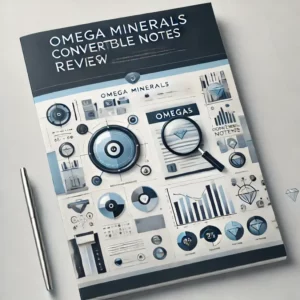In this post, we will review Omega Minerals convertible notes to see what the investment offering is all about and discuss what is a convertible note and what are the pros and cons of convertible notes.
UK-based Omega Minerals plc is a company with a primary focus on mineral and alluvial gold assets acquisition in Canada.
Compared to standard equity investments, convertible notes have higher risk and fewer control, but they also provide flexibility and possible benefits for early investors in particular.
If you are looking to invest as an expat or high-net-worth individual, which is what I specialize in, you can email me (advice@adamfayed.com) or WhatsApp (+44-7393-450-837).
Please remember not to put your money in any investment just based on this review alone. It’s important to consult a financial advisor as the facts here can change from the time of writing.
Omega Minerals Convertible Notes Investment
Omega Minerals offers a convertible note that bears interest of 5% per year, with a term of 18 months. The coupon is paid to investors twice a year.
This kind of debt security accrues interest and possesses the option to be exchanged for a certain quantity of the issuing company’s shares.

The aggregate yearly return on investment from the Omega Minerals convertible notes is 9.5%.
Prospective investors must invest at least 10,000 is US dollars, euros, or British pounds to subscribe to the offering.
Investors can opt to convert their notes to equity at a price of £0.36 per share. If the price of the company’s stocks climbs over this threshold, this might be advantageous.
The Omega Minerals convertible notes investment is backed by a substantial 10 million ounce gold resource in Canada.
The company holds extensive gold reserves and is actively engaged in late-stage reverse takeover and merger and acquisition discussions. Its market, Canada, is a desirable destination for mining investments due to its well-developed regulatory structure and mining-friendly laws.
Pros and cons of convertible notes investment
Convertible notes benefits
- When the trigger event takes place, convertible notes offer flexibility in how the investment is handled. Investors have the option of receiving their notes’ repayment in cash or as shares.
- Convertible notes frequently have a discount rate, which rewards early investors by allowing them to purchase shares at a cheaper price than their market value.
- Throughout the term of the note, convertible notes are subject to interest, which may be converted into a lump payment or paid in installments.
- Usually included in convertible notes, valuation caps guarantee investors a specific percentage of the business, even when the business experiences a sharp increase in value.
Convertible notes risks
- Owners of convertible notes have little to no power over how the business is run, including the ability to vote.
- Compared to common shareholders, convertible notes are more likely to face insolvency, particularly if the business is unable to get more equity funding.
- These notes frequently have severe indenture conditions, which can impose limitations and reduce the company’s flexibility.
- They may result in high debt, which makes it challenging for businesses to raise money during economic downturns.
Pained by financial indecision?

Adam is an internationally recognised author on financial matters with over 830million answer views on Quora, a widely sold book on Amazon, and a contributor on Forbes.



